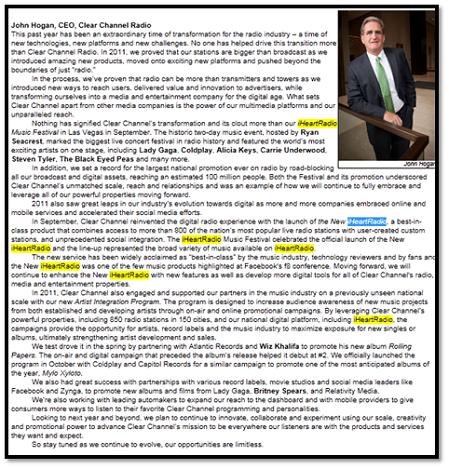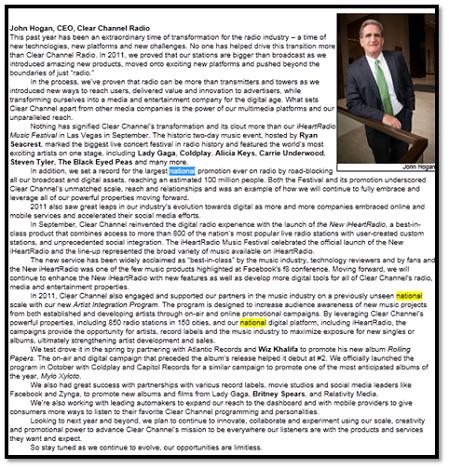As I talk to broadcasters during the course of our consulting and research work, as well as multiple speaking engagements at broadcaster events and state broadcaster associations during the course of last year, I continue to hear similar questions.
 Most everyone concurs that we’re living in a time of great change and upheaval in the media world (as well as in business and society as a whole). Many are simply trying to figure out how to “connect the dots” to determine where it’s all going and how they should be planning as a result.
Most everyone concurs that we’re living in a time of great change and upheaval in the media world (as well as in business and society as a whole). Many are simply trying to figure out how to “connect the dots” to determine where it’s all going and how they should be planning as a result.
In the radio broadcasting industry, one constant over the past couple decades or so has been the large footprint of Clear Channel. From Lowry Mays to Randy Michaels to John Hogan and now to Bob Pittman, as Clear Channel goes, so goes radio. Now you may argue with that premise, but just as General Motors held that same position for the auto industry over the years, it was true that like ‘em or not, they were a bellwether for the car business.
That’s true of Clear Channel in radio, and because so many companies coexist alongside them in markets as big as New York City and as small as Anchorage, understanding what they’re doing and how they’re thinking speaks volumes about where radio is going – and how to compete against them.
I was fortunate to be one of nine broadcasters who contributed to FMQB’s year-end “AT ISSUE: Charting the Future Course of the Industry.” While guys like me, Mike Henry, Jimmy Steal and others may have had interesting things to say, my advice to any of you who take the time to read the piece is to zero in on John Hogan’s comments.
While I’m sure Hogan didn’t give away Clear Channel’s secret blueprint, a little reading between the lines may provide clues about what the company is up to – and how you might be strategizing if you’re up against them.
So I did a simple word search with Hogan’s opinion piece. And look how many times “iHeartRadio” appears:
If you think that’s telling, look how many times the word “national” comes up in the same commentary:
Now you may be thinking that we’re only talking three mentions for “national” within his several hundred word statement. So I’ll save you the trouble – a search for the word “local” or a mention of any local call letters receives zero hits.
This is no knock on Hogan or Pittman or anyone else associated with Clear Channel. They are smart executives and they have a plan. Pittman’s return to radio has brought energy, vitality, and much-needed credibility to broadcasting.
No, this is simply an analytical exercise that seeks to make a point: This is what these guys are focused on.
So when it comes to your station, your company, and your career, what does their vision of 2012 say to you about your prospects and your plan? Strategically, what insights can you glean from Hogan’s statement about where the industry is headed, along with your place within it? How do you compete against them, coexist with them, or learn from them?
I’ll let you draw your own conclusions. Tomorrow, I’ll give you a few of mine.
- Simply Unpredictable - April 10, 2025
- Flush ‘Em Or Fix ‘Em?What Should Radio Do About Its Aging Brands? - April 9, 2025
- Radio: It’s Time To Stop Playing Small Ball - April 8, 2025






We live today in a 140 character world that is transparent and interactive- being clever, entertaining and compelling within these parameters is a good idea.
We do indeed, Jon. Thanks for the comment & for reading the blog.